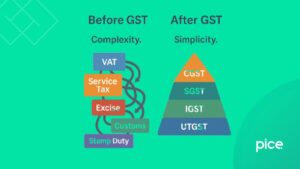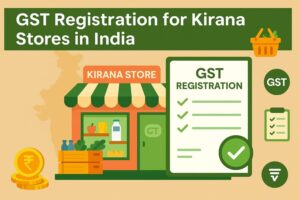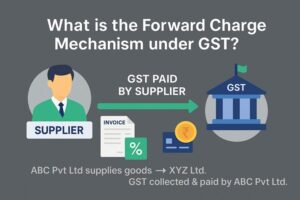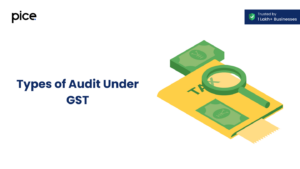GST For Freelancers: Applicability, Registration & Rates
- 17 Dec 24
- 11 mins

GST For Freelancers: Applicability, Registration & Rates
- What Is a Freelancer Under GST in India?
- Does a Freelancer Need to Register for GST?
- Understanding OIDAR Services
- Can a Freelancer Register Under the Composition Scheme?
- Compulsory Documents Required for GST Registration
- How to Register for GST for Freelancers?
- Which GST Rates Apply to Freelancers?
- How to Calculate GST for Freelancers in India?
- Invoicing Rules for GST-registered Freelancers
- Is a Freelancer Eligible to Claim an Input Tax Credit?
- How Many GST Filings Does a Freelancer Have to Complete?
- What Is the Penalty for Late Filing of Returns?
- Conclusion
Key Takeaways
- GST Threshold: Freelancers must register if earnings exceed ₹20 lakh (₹10 lakh for North-East).
- GST Rate: Most freelance services attract an 18% GST rate.
- Input Tax Credit: Freelancers can claim ITC to lower GST liability.
- Filing Requirement: Freelancers must file 25 GST returns annually.
- Penalties: Late filing attracts a ₹200 fee and 18% interest on unpaid tax.
As India has become a hotspot for highly skilled freelancers, the country’s freelancing economy has expanded significantly over the last few years. However, the industry mostly operates in an unorganised fashion with little involvement in legal regulations.
Today, GST for freelancers varies for different professions, but there has been some misinterpretation in the market due to a lack of structured information. As a starting point, any freelancer must collect 18% GST from their clients for the related service. For more details in this area, we suggest you keep reading.
What Is a Freelancer Under GST in India?
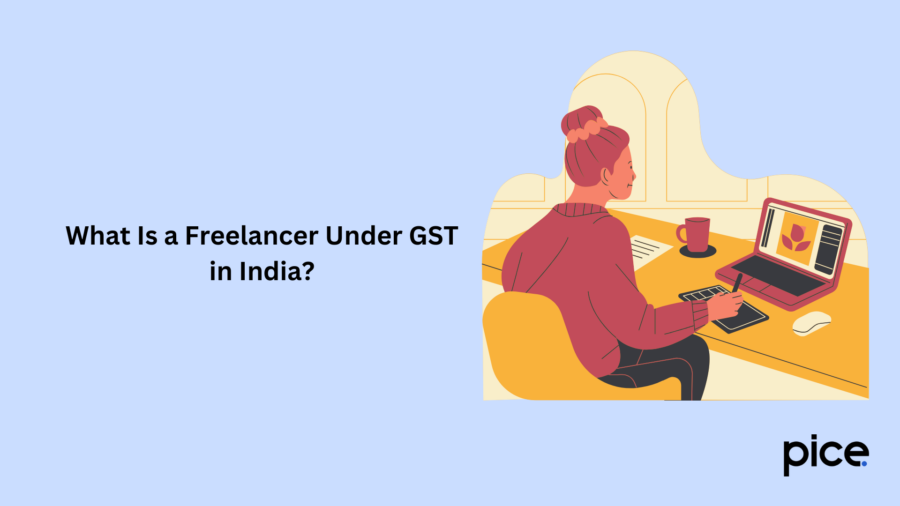
As per the considerations under GST (Goods and Services Tax) law, a freelancer is a person who offers services on a contract basis to multiple clients. They do not work full-time for a company and thus do not need to follow the conventional GST laws for salaried employees. Nevertheless, there are separate GST rules tailored for freelancing individuals.
Examples of Services Subject to GST in India
For the following services, a flat 18% applicable tax rate is followed:
- Membership Fees
This comprises any charges meant to buy a subscription to a club, society or association for offering any service to the concerned members.
- Connects Purchases and Freelancer Service Fees
Connects are nothing but digital tokens that freelancers need to apply for new job opportunities on online marketplaces. On the other hand, freelancer service fees refer to the deductions that the online platforms make from freelancers' earnings as commissions.
Other freelancing services that are subject to GST include:
- Accounting/Bookkeeping
- Application/Software Development
- Digital Marketing Services
- Technical Services
- Call Centre
- Data Entry
- Domain and Hosting
- Web Designing Services
- Language Translation and Transcription Jobs
- Management or Consultancy Services
Here's an additional tip for people looking to hire GST-registered freelancers:
Make sure to verify the validity of an individual freelancer's GST number. You may easily accomplish this by using an online GST number search tool.
Does a Freelancer Need to Register for GST?
Any freelancer in India is required to register under GST if their yearly income crosses the government-specified threshold. Typically, this limit is ₹20 lakh and may vary slightly based on an individual’s service and state.
For all freelance service providers, GST registration becomes compulsory under the following circumstances:
- When their annual income is more than ₹20 lakh (this rule applies to all states except for North-East India)
- For North-East states, the annual threshold is ₹10 lakh.
- If you offer services that fall under Online Information and Database Access and Retrieval (OIDAR) services, then also GST registration is mandatory.
- Finally, if you are involved in an export service with an annual turnover exceeding ₹20 lakh, GST enrolment is required.
Understanding OIDAR Services
Based on the GST norms, OIDAR services include the following:
- Offering cloud-based service provision
- Advertising through digital e-commerce platforms
- Content marketing services
- Digital Services like online gaming services
- Providing crucial data or information, retrieval or otherwise to people via the Internet
- Selling e-books, software, music, movies and other additional services through a digital network
Can a Freelancer Register Under the Composition Scheme?

As no service providers are allowed to avail the composition scheme under GST, freelancers too cannot register themselves as composite dealers. However, service providers offering restaurant services are an exception to this principle.
In short, GST for freelancers cannot be considered under the composition plan.
Compulsory Documents Required for GST Registration
To remain GST-compliant as a freelancer from the start, you must clearly understand the documentation procedure. The following constitutional documents are a must while completing GST registration:
- A recent passport-sized photograph
- Recent bank account details like a bank statement/a cancelled cheque
- Scanned copies of the freelancer’s Aadhaar card and PAN card details
- Digital signature certificate (DSC)
- Identity and address proof documents
- A copy of the genuine lease/rental agreement of office premises if you open an office along with a No Objection Certificate (NOC) from the property owner establishing solid proof of business use on the mentioned premises
- HSN (Harmonised System of Nomenclature) or SAC (Service Accounting Code)
How to Register for GST for Freelancers?
If you want to grasp the freelance GST registration process for freelance business owners in detail, be sure to go through these steps:
- Step 1: Open the official GST website and navigate to the online registration option. Proceed to make a new account or log in if you have already made one.
- Step 2: To start the application process, carefully provide all the requested information by accessing an e-registration form.
- Step 3: Provide the necessary information about your freelance venture. Some data that you will need to present are business name, contact information, business address, class of services delivered and annual turnover-related information.
- Step 4: Upload scanned copies of your KYC documents. These include your address and ID proof papers besides some supporting documents as mentioned by the GST Commission.
- Step 5: Carefully go through the details that you have already entered. It is a mandatory step for all business owners to ensure flawless application. So, double-check each field to prevent any unwanted registration delays or complications.
- Step 6: Take a record of the provisional ID. It is a temporary identification number issued to your business, indicating that your application has been submitted.
- Step 7: Wait for the tax authority’s approval when you have finally submitted the application through the website. Approval from their end can take up to a few weeks, depending on the jurisdiction.
- Step 8: If everything goes as expected, your business is successfully registered under GST. Thereafter, you are assigned a unique GST Tax Identification Number (GSTIN) via email for verification and receive a valid GST registration certificate.
Which GST Rates Apply to Freelancers?
Depending on the category of services, the applicable slab rates of GST for freelancers can be 0%, 5%, 12%, 18% and even 28%. In cases where there is no stipulated rate for a particular service then the service provider should charge an 18% rate for freelancers.
For freelancers who are new to GST terms, they may find it challenging to factor in profit margins. However, they can effortlessly navigate the situation to determine GST-inclusive and exclusive rates by using a free online GST calculator.
How to Calculate GST for Freelancers in India?
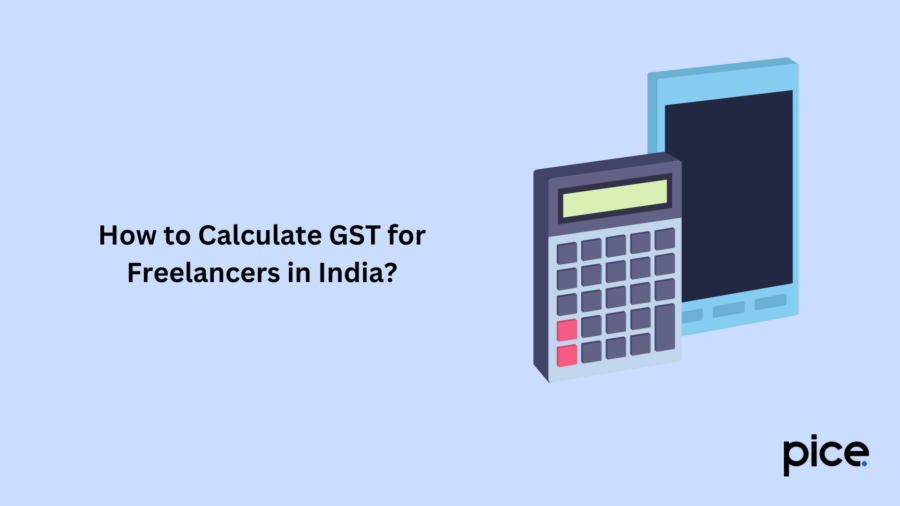
Any Indian freelancer with an annual return above ₹20 lakh, needs to know the applicable GST rates to incorporate them into their service charges.
Here is a thorough explanation:
As mentioned earlier, for most freelancing activities, the applicable GST rate is 18%. However, some exceptions are there in the market. To confirm the exact GST rate stipulated on your service, consider referring to the rates against the HSN and SAC Codes provided on the official GST website. If you do not find the service code you are looking for, assume a flat 18% GST in that case.
Next, comes calculating the GST amount. Suppose, you are charging one of your clients ₹14,500 for the services you provided and the GST rate is 18%. If that is the case, then you can manually find out the applicable GST by multiplying the service fee by 0.18.
GST amount = Service fee * GST rate as decimal = ₹14,500 * 0.18 = ₹2,610
Now, to find the final invoice amount that you will send to your client, consider adding the GST amount to your service fee. Also, while making the invoice you must mention all of these three components:
- Your service fee (exclusive of GST)
- The total applicable taxes as a percentage
- Total payable amount (GST inclusive amount)
Here is a quick example of a freelancer’s sample invoice:
Service Fee (Exclusive of GST): ₹14,500
GST @18%: ₹2,610
Total Due Amount: ₹17,110
Invoicing Rules for GST-registered Freelancers
All the invoices issued by a freelancer must be GST-compliant. To meet the relevant guidelines, your GST bill must display your name, address, GSTIN besides that of the client, date of supply, the service fee, SAC of services and more. For a detailed guide, you can refer to free GST invoice templates available online.
Is a Freelancer Eligible to Claim an Input Tax Credit?

Input tax credit (ITC) allows you to decrease the direct tax liability on sales by deducting the tax already paid on business purchases. Based on the prevalent GST provisions, all the regular taxpayers enrolled under GST can take advantage of ITC to minimise their GST liabilities.
Likewise, a GST-compliant freelancer can utilise taxes paid on services used by them to offer a particular service. Let us understand with an example:
Suppose, a freelance digital marketer charges ₹1,75,000 for a marketing campaign and meanwhile he hires a content writer at ₹50,000 to meet the content requirements of a website. In this case, the net payable GST for the freelancing digital marketer will be as follows:
| Particulars | Amount (in ₹) |
| Digital marketing services provided | 1,75,000 |
| Add: GST applicable on services (18%) | 31,500 |
| Total chargeable amount | 2,06,500 |
| Staffing charges paid | 50,000 |
| Add: GST on services received (18%) | 9,000 |
| Total paid amount | 59,000 |
| Net GST amount the photographer must pay | |
| GST due on output services | 31,500 |
| GST already paid for services received | 9,000 |
| Net GST payable | 40,500 |
How Many GST Filings Does a Freelancer Have to Complete?
If a freelancer in India registers themselves under GST, then they must file 25 GST returns altogether to remain legally compliant.
What Is the Penalty for Late Filing of Returns?
When it comes to GST for freelancers in India, late filing returns can bring in the below-mentioned consequences:
- The person is charged a late fee of ₹200.
- An added annual interest charge of 18% is also levied. This amount gets added to the final tax payable sum.
- The GST Council stipulates a minimum penalty of Rs.10,000 when tax has not been furnished.
- In cases of unsettled tax, the maximum penalty can reach up to 10% of the due GST amount.
Conclusion
In summary, grasping the idea of the exact rate of GST for freelancers is very much essential for any normal taxpayer who is involved in similar business operations. It ensures seamless workflow and 100% legal compliance. Moreover, when you register yourself as a freelancer, one of the greatest advantages of GST registration is that it improves your credibility and helps streamline the tax formalities.
Although navigating each minute of the tax process as per GST regulations can be daunting at first, you will eventually become comfortable with it. For added support, you can always rely on experienced professionals who can further ease the landscape.
💡If you want to streamline your payment and make GST payments, consider using the PICE App. Explore the PICE App today and take your business to new heights.
 By
By 






